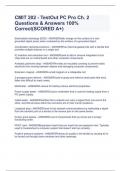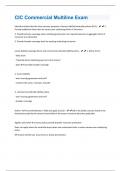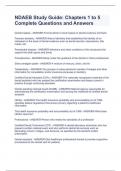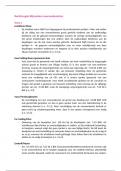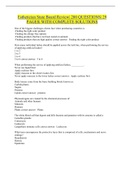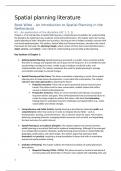Chapter 1: Organization theory: challenges and perspectives
Organization Theory: is concerned with the study of various theories about
organizations that have developed since the latter part of the nineteenth century.
Organization Studies: Texts that bear this title are typically concerned with the
understanding of different themes in the study of organizations in order to produce
knowledge about organizations that represents a contribution to social science.
Organization Analysis: is typically the study of the processes that underpin the
operation of organizations, typically with the purpose of improving the operations of
organizations.
Organization Behaviour: is typically concerned with developing an understanding of
the ways in which members of organizations can develop behaviours that enable their
commitment to the purposes of the organization so that typical themes include theories
of managing people, motivation, leadership, creating effective work groups, managing
diversity and so on.
Management Theory: is typically concerned with the study of theories about the nature
and purpose management that have developed since the latter part of the nineteenth
century.
Management Studies: are typically concerned with the understanding of different
themes in the study of management in order to produce knowledge about management
that represents a contribution to scientific approaches to, and understanding of, the
activities known as management and leadership.
,Chapter 2: Organization theory: what is it, and why does it matter?
Organization theory is important in two key respects:
1. Organization theory helps us to reflect upon and understand who we are and
why we are who we are.
2. Organization theory is about us and how we interact with others during our
encounters in a vast array of different, often deceptively ordinary and mundane,
social contexts that we take for granted because we cannot see or imagine any
alternative to how things appear to be.
In sum theories do the following:
1. Theories are linguistic, conceptual devises that try to tell us things about the
world by representing it in a causal manner.
2. Theories define, classify or categorize aspects of the world (the what)
3. Theories propose reasons in the form of cause-and-effect relationships that
explain the variation of a particular phenomenon in terms of the effects of the
action of, or the variation in, another phenomenon (the why and how).
4. Theories identify the situations or contexts when these causal relationships will
or will not operate, and thereby set the boundaries to where they are applicable.
5. Based on this what, why, how, when and where analysis, theories then can guide
our actions because they enable predictions and hence potentially enable us to
anticipate and try to influence or even control events.
6. Theories are not divorced from our everyday lives and behaviors, but they often
form our common sense to make sense of our experiences and guide our actions.
7. Theories matter, because they influence what happens to people.
Theories are highly influential upon what we do and why we do it. Theories allow us to
see the world in particular ways. They guide our reasoning and our actions.
Positivist: Positivists regards concepts like organization, organization structure and
management as social facts. These phenomena that exist in their own right and they are
explained by other social facts.
Functionalist: the different parts of an organization, the sub-systems such as culture,
structure and management, all have a purposive role in the maintenance and
development of the organization. A group of people may set out to create an
organization, but the form that the organization takes as it develops takes on a life of its
own as there are imperatives, contingencies that needs to meet. See the contingency
theory from Donaldson in chapter 3.
There are different definitions of an organization. Schein (1970) has one:
An organization is the rationale coordination of the activities of a number of people
for the achievement of some common explicit purpose or goal, through division of
labor or function, and through a hierarchy of authority and responsibility.
Silverman (1970): do organizations really have one goal?
Gouldner (1959): Goals of the organizations are those of its top administrators.
Reification: convert a person or a concept into a thing.
, Anthropomorphisation: The ascription of human form, qualities and attributes to a
non-human form.
The relationship of any type of social science theory, such as organization theory, and its
subject matter is always problematic, because its subject matter consists of
knowledgeable beings who are self-aware, are aware of others’ behavior, have the power
of sensory perception and are capable of feeling. In other words, social science is
concerned with the behavior of sentient human beings.
Hermeneutic: the ways in which we interpret and understand phenomena.
The double hermeneutic (Giddens): interaction between social science theory and the
theories of everyday. In social science we study people and society, but people use these
science to change their practice. So it is a two-way understanding.
Reflexivity: There is no one-way street between the researcher and the object study;
rather the two affect each other mutually and continually in the course of the research
process.
The double hermeneutic raises two sets of issues:
1. The ways in which social science derived organization theories, through their
social dissemination, can influence: the creation, maintenance and development
of organizations and the routine practices of their participants.
2. The ways in which organization members deploy theory from various sources in
understand and practically developing, maintaining and changing their
organizations and how this influences the development of social scientists’
theories about organization.
The theory should make a contribution to management, but they didn’t because it was
not practical useful through the technical language that was used to get the theory
published in journals. Weick (1989): Theoretical endeavors where hemmed in by
methodological strictures that favor validation rather than usefulness.
Any scientific endeavor is underpinned by philosophical assumptions about ontology
and epistemology (Reed, 1993). The ontology influences the epistemology.
Ontology: the way we think the world is.
Epistemology: what we think can be known about the world.
Ontology is concerned with the nature of phenomena and their existence. It raises the
questions regarding whether or not a phenomenon we are interested in actually exists
independently of our knowing and perceiving it. There are two kinds: the realist
assumptions and the subjectivist assumptions.
Realist assumptions: this entails the view that phenomena such as organizations exist,
out there independently of our perceptual or cognitive structures and attempts to know.
Subjectivist assumptions: this entails the view that what we take to be social reality is
a creation or projection of out consciousness and cognition.
Epistemology is the study of the criteria we deploy and by which we know and decide
what does and does not constitute a warranted claim about the world or what might
constitute warranted knowledge.



